National symbols of Kasterburg: Difference between revisions
From MicrasWiki
Jump to navigationJump to search
No edit summary |
|||
| (3 intermediate revisions by one other user not shown) | |||
| Line 1: | Line 1: | ||
The '''national symbols of Kasterburg''' are the symbols used in the [[Kasterburg|Kasterburg Republic]] and abroad to represent the nation and its people. The country has a number of national symbols. None of the national symbols of the nation are defined by law but have become part of the national conciousness over the years. | {{Kasterburg Article}}The '''national symbols of Kasterburg''' are the symbols used in the [[Kasterburg|Kasterburg Republic]] and abroad to represent the nation and its people. The country has a number of national symbols. None of the national symbols of the nation are defined by law but have become part of the national conciousness over the years. | ||
== List of symbols == | == List of symbols == | ||
| Line 37: | Line 37: | ||
| The official language of Kasterburg is Batavian, although many other languages are spoken such as Common, Shirithian, Jiddish and Laqi. Most goverment documents are available in Batavian and Common. | | The official language of Kasterburg is Batavian, although many other languages are spoken such as Common, Shirithian, Jiddish and Laqi. Most goverment documents are available in Batavian and Common. | ||
|- | |- | ||
| People | | rowspan="2"|People | ||
| style="text-align:center;"|[[File:Demontfort.png|150px]]<br>Reginald de Montfort | | style="text-align:center;"|[[File:Demontfort.png|150px]]<br>Reginald de Montfort | ||
| Father of the Kasterburger nation, de Montfort lead the exodus from Shirithian-occupied Batavia towards the Kasterburger plains and remains the leader of the young Republic until this day. | | Father of the Kasterburger nation, de Montfort lead the exodus from Shirithian-occupied Batavia towards the Kasterburger plains and remains the leader of the young Republic until this day. | ||
|- | |||
| style="text-align:center;"|[[File:JodocusvHaltna.jpg|150px]]<br>Jodocus van Haltna | |||
| The Vaderdesvaderlands, or founder of the Batavian nation still holds an important position in the cultural legacy of the ethnic Batavian population of the Republic. As first regent of Batavië, van Haltna guided the nation through its early years. Jodocus van Haltna is often portrayed in a revisionist light, in order to compare his story to that of the current Kasterburger government. | |||
|- | |- | ||
| National animal | | National animal | ||
| Line 59: | Line 62: | ||
[[Category:Kasterburg]] | [[Category:Kasterburg]] | ||
[[Category:Symbols]] | |||
Latest revision as of 01:26, 2 December 2019
The national symbols of Kasterburg are the symbols used in the Kasterburg Republic and abroad to represent the nation and its people. The country has a number of national symbols. None of the national symbols of the nation are defined by law but have become part of the national conciousness over the years.
List of symbols
| National Flag |  Flag of the Kasterburg Republic |
The flag of Kasterburg consists of two horizontal stripes of equal width, the upper one white, the lower one green. The flag was adopted by settlers from Batavia around the year 1655 AN. The colour white was chosen to represent the new start of the Republic, and the colour green represents both the plains of Kasterburg and the expected national prosperity. |
| Coat of Arms | 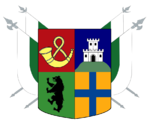 Coat of arms of the Kasterburg Republic |
The Coat of Arms of Kasterburg was adopted in the year 1657 AN to replace the provisionary Coat of Arms. The description of the Coat of Arms is as follows: Quarterly, 1 Gules, a Hunting Horn stringed Or (for the Gouw of Hoorne); 2 Azure, on a Mount Vert, issuant therefrom a Castle Argent (for the Gouw of Kasterburg); 3 Vert, a Bear rampant Sable queue fourché (for the Gouw of Porolia); 4 Or, a cross Azure (for the Gouw of Ostesia). |
| State Religion |  Reformed Catologian Church |
The official religion of Kasterburg is Reformed Catologism, a distinct brand of Catologism that originated in Batavia. Central to the Reformed Catologian religion is the belief in Cato as the one God, in which five different aspects are present, depicted as gods (with a non-capital letter). Reformed Catologism is strongly dogmatic and determinist, with an important role of fate, called Schicksal. Drinking of sacred beer is also an important sacrament in the Church. |
| National Calendar | Revised Norton Calendar |
Kasterburg uses a calendar based upon the Shirithian Norton Calendar, updated to the cultural situation of the Republic. Years follow the Norton Calendar, but often a reference to the establishment of the Republic is added. The names of Months and Days are taken from the Batavian Calendar. |
| National Anthem | "Awake, the Voice calls to Us" Anthem of the Kasterburger Republic |
The anthem of Kasterburg is taken from a concerto by the Batavian composer Sebastiaan Johan Baak. |
| Motto | Heft op een Baniere, op eene Hoogen Berch Motto of the Kasterburger Republic |
The Kasterburger motto is a quote from holy Catologian scripture rendered in old Batavian. Translated, it means Raise up a Banner, upon a High Mountain. The motto references the arrival of the settlers at Kasterburg castle, which is located on a mountain. When the Kasterburger flag was raised, this passage was quoted. |
| National language | Batavian | The official language of Kasterburg is Batavian, although many other languages are spoken such as Common, Shirithian, Jiddish and Laqi. Most goverment documents are available in Batavian and Common. |
| People | 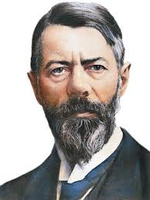 Reginald de Montfort |
Father of the Kasterburger nation, de Montfort lead the exodus from Shirithian-occupied Batavia towards the Kasterburger plains and remains the leader of the young Republic until this day. |
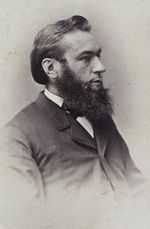 Jodocus van Haltna |
The Vaderdesvaderlands, or founder of the Batavian nation still holds an important position in the cultural legacy of the ethnic Batavian population of the Republic. As first regent of Batavië, van Haltna guided the nation through its early years. Jodocus van Haltna is often portrayed in a revisionist light, in order to compare his story to that of the current Kasterburger government. | |
| National animal | 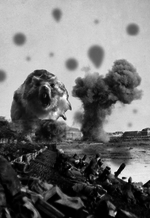 Tyrannocricetus aliger |
The Tee-Al is regarded as the national animal of Kasterburg, this highly aggressive species of giant avian cricetid resides in central Benacia where, despite being native, it is considered an invasive species due to its engineered origin. The Kasterburger plains are the summer breeding ground for these creatures, who often cause havoc among the local population. |
| National sport | 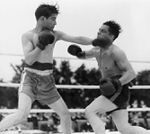 Boxing |
Boxing is the most popular sport in Kasterburg, and was the first sport that had a national federation in Kasterburg. |
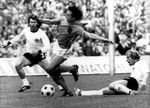 Football |
A remnant from Batavian culture, football is also widly played. The National Society for Physical Exercise regulates football in the Republic and is in charge of the national team | |
| National liquor | 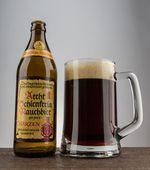 Smoked Beer |
Kasterburger Rookbier (Smoked Beer), is a national delicacy. The largest manefacturer is St. Gesellmann Brewery in southern Porolia. |